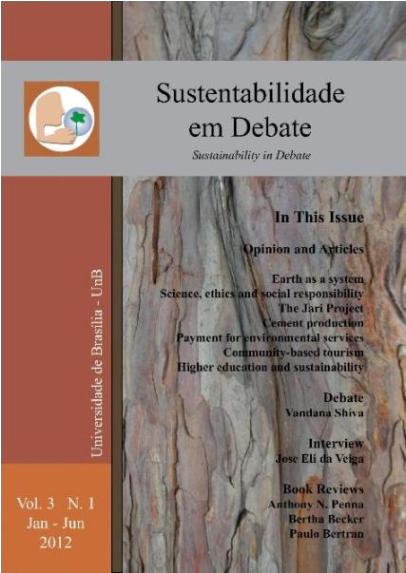Educação e desenvolvimento sustentável:
a expansão do ensino superior na região metropolitana do Cariri
DOI :
https://doi.org/10.18472/SustDeb.v3n1.2012.7200Mots-clés :
Desenvolvimento Sustentável, Ensino Superior, Políticas PúblicasRésumé
Este artigo aborda a expansão da oferta de vagas na rede de ensino superior no Brasil, com foco para a região do Cariri, interior do Estado do Ceará, nordeste do Brasil. Pressupõe que o acesso à educação cria condições favoráveis à propositura e consolidação do Desenvolvimento Sustentável. Estudos dessa natureza em regiões historicamente excluídas concorrem positivamente para o processo de desenvolvimento sustentável. A pesquisa foi realizada a partir da coleta e tratamento dos dados relativos à Educação Superior no Brasil e no Cariri entre os anos de 2002 a 2009, obtidos por meio do Instituto Nacional de Estudos e Pesquisas Educacionais Anísio Teixeira (INEP), e do banco de dados de quatro instituições de ensino superior localizadas no Cariri cearense. No Cariri cearense constatou-se o crescimento no acesso ao ensino superior na última década, esse fato tem relação com o aumento do investimento público e ainda a participação da iniciativa privada, criando o que se pode chamar de sistema híbrido de financiamento. Essa realidade vem contribuir para a criação de um contexto propício ao desenvolvimento da região, tendo em vista as mudanças que o acesso à educação pode proporcionar para a vida de cada cidadão e no conjunto para todo o entorno.
Téléchargements
Références
H. G.; SANTIAGO Marcelo. O. Carreiras Universitárias
e A Estratificação Social Do Ensino
Médio ”“ Um Estudo Piloto do Reflexo da Expansão
do Ensino Superior Federal no Cariri
Cearense. In: VII Semana de Humanidades UFC/
UECE. Humanidades fronteiras em movimento. UECE/
UFC, 2010.
BRASIL. Constituição da República Federativa do
Brasil: promulgada em 5 de outubro de 1988. Brasília, DF: Senado, 1988.
BRASIL. Decreto nº 6.096, de 24 de abril de 2007.
Institui o Programa de Apoio a Planos de
Reestruturação e Expansão das Universidades
Federais ”“ REUNI. Brasília, DF: Diário Oficial da
União, 25 abr., 2007.
BURSZTYN, Marcel. (Org.). Ciência, ética e
sustentabilidade ”“ 2. ed. ”“ São Paulo: Cortez;
Brasília, DF : UNESCO, 2001.
FREIRE (2001). Educação e mudança. 24ª ed. São
Paulo: Paz e Terra.
GADOTTI, M. (2006). Paulo Freire e a boniteza
do sonho de ensinar-e-aprender com sentido. In:
Scocuglia, A. Paulo Freire na História da Educação do
Tempo Presente. p.211.
GALBRAITH, John K. A economia ao alcance
de quase todos. São Paulo: Pioneira
GRUPO ESPECIAL SOBRE EDUCACIÓN
SUPERIOR Y SOCIEDAD. La Educación Superior
en los Países en Desarollo: Peligros y
promesas. 2000. Disponível em: <http://
worldbank.org>. Acesso em: 20 jun. 2009.
INSTITUTO NACIONAL DE ESTUDOS E
PESQUISAS EDUCACIONAIS ANÍSIO
TEIXEIRA (INEP). Resumo Técnico Censo da
Educação Superior 2007. Brasília, 2008.
_____. Resumo Técnico Censo da Educação Superior
2008 (Dados Preliminares). Brasília, 2009.
_____. Resumo Técnico Censo da Educação Superior
2009. Brasília, 2010.
MICHELOTTO, Regina. M; COELHO, Rúbia.
H; ZAINKO, Maria. A. S. A política de expansão
da educação superior e a proposta de reforma
universitária do governo Lula. Curitiba: Educar,
n. 28, p.179-198, 2006.
ONU. Declaração e Programa de Ação sobre uma
Cultura de Paz. Resolução aprovada por Assembléia
Geral em 06 de outubro de 1999, nº 53/243,
1999.
ROSSI, Wagner. Capitalismo e Educação. 3. ed.
São Paulo: Ed. Moraes, 1980. CHACON, Suely
Salgueiro. O Sertanejo e o caminho da s águas:
políticas públicas, modernidade e sustentabilidade
no semi-árido. Série Teses e Dissertações. Vol. 8.
Fortaleza: BNB, 2007
SAVIANI, Demerval. Educação: Do senso comum
a consciência Filosófica. 17. ed. Campinas ”“
SP: Autores Associados,2002
SEN, Amartya. Desenvolvimento como liberdade.
Trad. Laura Teixeira Motta. São Paulo: Cia.
das Letras, 2000.
SOARES, Maria Susana A. (Org.). Educação Superior
no Brasil. Brasília: Coordenação de Aperfeiçoamento
de Pessoal de Nível Superior, 2002.
Téléchargements
Publié-e
Comment citer
Numéro
Rubrique
Licence
SUSTAINABILITY IN DEBATE – Copyright Statement
The submission of original scientific work(s) by the authors, as the copyright holders of the text(s) sent to the journal, under the terms of Law 9.610/98, implies in the concession of copyrights of printed and/or digital publication to the Sustainability in Debate Journal of the article(s) approved for publication purposes, in a single issue of the journal. Furthermore, approved scientific work(s) will be released without any charge, or any kind of copyright reimbursement, through the journal’s website, for reading, printing and/or downloading of the text file, from the date of acceptance for publication purposes. Therefore, the authors, when submitting the article (s) to the journal, and gratuitous assignment of copyrights related to the submitted scientific work, are fully aware that they will not be remunerated for the publication of the article(s) in the journal.
The Sustainability in Debate Journal is licensed under Creative Commons License – Non-Commercial-No-Derivation Attribution (Derivative Work Ban) 3.0 Brazil, aiming at dissemination of scientific knowledge, as indicated on the journal's website, which allows the text to be shared, and be recognized in regards to its authorship and original publication in this journal.
Authors are allowed to sign additional contracts separately, for non-exclusive distribution of the works published in the Sustainability in Debate Journal (for example, in a book chapter), provided that it is expressed the texts were originally published in this journal. Authors are allowed and encouraged to publish and distribute their text online, following publication in Sustainability in Debate (e.g. in institutional repositories or their personal pages). The authors expressly agree to the terms of this Copyright Statement, which will be applied following the submission and publishing by this journal.









